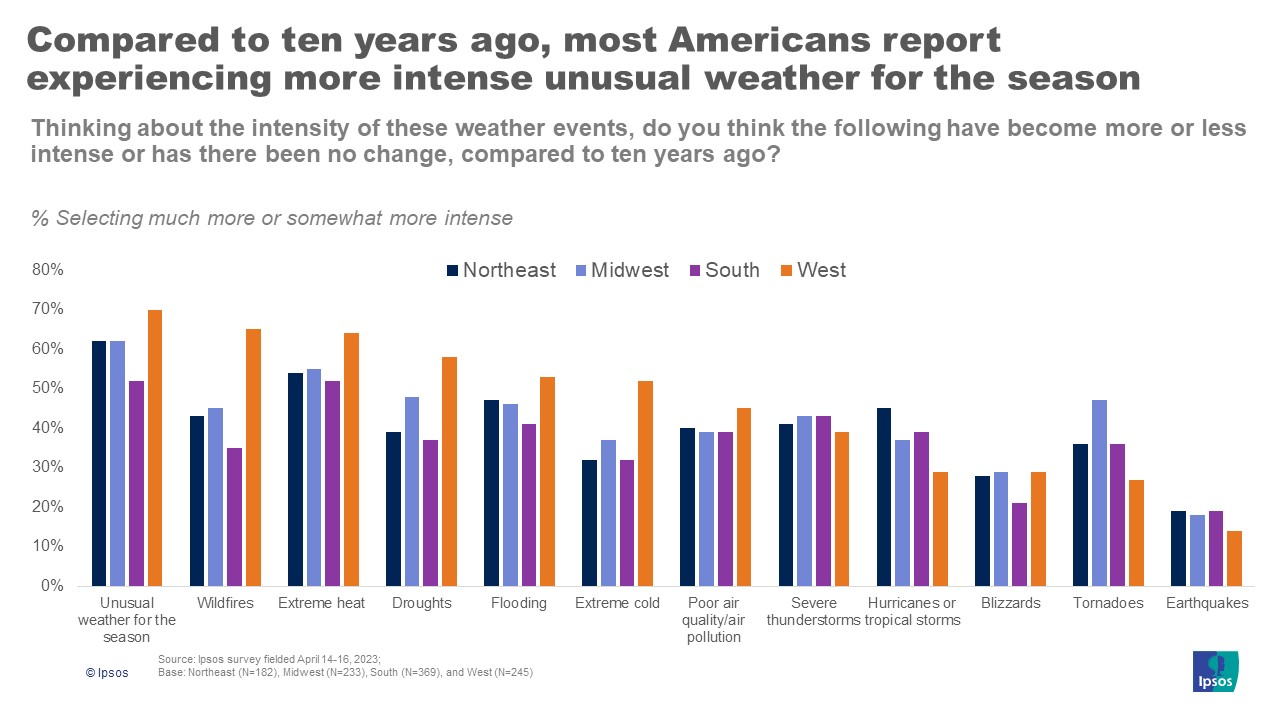Many Americans believe that climate change is mostly caused by human activity, but few report making changes to help limit it
Washington DC, May 04, 2023—New Ipsos polling finds Americans are split on what is causing climate change—if it is happening at all, something that hasn’t changed in the past five years. Yet, among Americans who believe climate change is caused by human activity, most agree that people could slow or reverse climate change but aren’t willing to modify their behavior. Separately, most Americans continue to experience some form of extreme weather that’s become more frequent or intense in their area compared to ten years ago.
There are some regional differences in experiences with extreme weather. Partisanship, though, mediates people’s attitudes and experiences with climate change and extreme weather.
Detailed Findings
About half (49%) of Americans believe climate change is mostly caused by human activity, unchanged from 2017 and 2018.
- However, while many Americans believe climate change is caused by human activity, over a quarter (27%) believe it is mostly caused by natural patterns, and 7% believe it is not happening at all.
- Nearly half of Republicans believe climate change is caused by natural patterns (46%) compared to just 13% of Democrats.
Among those who believe climate change is caused by human activity, the majority (62%) agree that humans could slow or reverse climate change but aren’t willing to change their behavior.
- Along these lines, less than half of Americans say they are likely to make changes in the next year to help limit climate change, such as using public transportation (21%), trading in their car for an electric vehicle (25%), or walking or biking to close locations instead of driving (36%).
- Democrats are more likely than Republicans to make changes in the next year to help limit climate change, such as using public transportation (30% of Democrats vs. 14% of Republicans), trading in their car for an electric vehicle (38% vs. 10%), and walking or biking to close locations instead of driving (45% vs. 26%).
- More than half of the Americans believe that it is not too late to stop climate change (54%). Three in five Democrats (60%) believe that it is still possible and not too late to stop climate change compared to 52% of Republicans.
Most Americans report experiencing some form of extreme weather, however this varies by region and political affiliations.
- Two-thirds say unusual weather for the season has gotten more frequent (67%) and more intense (60%) in their area compared to ten years ago. Majorities of Americans, regardless of region, report that unusual weather has become more frequent.
- Other common types of extreme weather people experience include extreme heat (55%), and poor air quality or air pollution (43%), with many Americans reporting that these events have become more frequent and more intense where they live relative to ten years ago.
- Majorities of people living out West say that extreme heat (63%) has become more frequent in their area in the past decade compared to those in the Northeast (54%), Midwest (51%), and South (52%).
- Compared to ten years ago, people in the Northeast are more likely than people in the South to report that flooding (Northeast 47% vs. South 41%) and hurricanes or tropical storms (Northeast 45% vs. South 39%) have become more intense in their area. Whereas people living out the West are more likely than those living in the Midwest, Northeast, and South to say that weather events such as droughts (West 58% vs 48% Midwest vs Northeast 39% vs South 37%) and wildfires (West 65% vs Midwest 45% vs Northeast 43% and South 35%) have become more intense.
- One in three people in the South (33%) feel that tornadoes have become more frequent, however that is lower than what people report in the Midwest (44%).
Additionally, for all extreme weather occurrences, Democrats are more likely than Republicans to say they have become more frequent and intense in their area over the past ten years.

About the Study
These are the findings of an Ipsos poll conducted between April 14-16, 2023. For this survey, a sample of 1,029 adults age 18+ from the continental U.S., Alaska, and Hawaii was interviewed online in English. The sample includes 302 Republicans and 287 Democrats.
The sample was randomly drawn from Ipsos’ online panel, partner online panel sources, and “river” sampling and does not rely on a population frame in the traditional sense. Ipsos uses fixed sample targets, unique to each study, in drawing a sample. After a sample has been obtained from the Ipsos panel, Ipsos calibrates respondent characteristics to be representative of the U.S. Population using standard procedures such as raking-ratio adjustments. The source of these population targets is U.S. Census 2019 American Community Survey data. The sample drawn for this study reflects fixed sample targets on demographics. Post-hoc weights were made to the population characteristics on gender, age, race/ethnicity, region, and education.
Statistical margins of error are not applicable to online non-probability polls. All sample surveys and polls may be subject to other sources of error, including, but not limited to coverage error and measurement error. Where figures do not sum to 100, this is due to the effects of rounding. The precision of Ipsos online polls is measured using a credibility interval. In this case, the poll has a credibility interval of plus or minus 3.7 percentage points for all respondents. Ipsos calculates a design effect (DEFF) for each study based on the variation of the weights, following the formula of Kish (1965). This study had a credibility interval adjusted for design effect of the following (n=1,029, DEFF=1.09, adjusted Confidence Interval=+/-5.2 percentage points).
The poll also has a credibility interval of plus or minus 6.9 percentage points for Republicans and plus or minus 7.1 percentage points for Democrats.
For more information on this news release, please contact:
Jennifer Berg
Vice President, US
Public Affairs
+1 312 526 4224
About Ipsos
Ipsos is the world’s third largest Insights and Analytics company, present in 90 markets and employing more than 18,000 people.
Our passionately curious research professionals, analysts and scientists have built unique multi-specialist capabilities that provide true understanding and powerful insights into the actions, opinions and motivations of citizens, consumers, patients, customers or employees. We serve more than 5000 clients across the world with 75 business solutions.
Founded in France in 1975, Ipsos has been listed on the Euronext Paris since July 1st, 1999. The company is part of the SBF 120 and the Mid-60 index and is eligible for the Deferred Settlement Service (SRD).
ISIN code FR0000073298, Reuters ISOS.PA, Bloomberg IPS:FP www.ipsos.com



